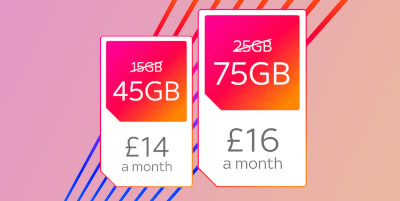
Your guide to SIM only deals
The world of mobile SIMs can be a little bewildering at first glance, with any of a dozen or more popular providers offering a host of different SIMs under a host of different contract terms. How much data do you get? What are the roaming terms? How long is the contract? Is this SIM good value for money? There are a lot of questions you'll need to have some idea of the answer to before selecting your ideal SIM.
So, where to start? Well, in this buyer's guide, and with the help of the comparison tools above, we aim to take you through each step you need to take in order to choose your ideal SIM. If you already know the answer to, or have already taken any particular step, feel free to skip it. And likewise, if you're a seasoned SIM-hound then, well, what are you doing here? Get comparing!
Without further ado then, here's how to choose the perfect SIM:
Step 1: How much data do you need?
Unlimited SIMs – where you'll never run out of data – are all the rage these days, but in reality, at the time of writing in spring of 2024, completely unnecessary for most people. In fact, according to Ofcom the average mobile user consumed just 8GB of data per month. 8GB! Puts all those 100GB and Unlimited SIM deals in perspective doesn't it.
Understanding your data needs then, is crucial to selecting the right one, and should be your first consideration. The first and best way to understand your mobile data usage is find that figure on your phone. All modern smartphones keep a count over how much mobile data you're using, with the best part being it won't count data used via wifi in this figure, giving you a very precise figure as to how much you actually need.
If for some reason you don't have that figure or are taking on a new phone you need a separate SIM for, the following table should give you enough of an idea to make a good guess. When totting this up, be sure and count only times when your phone isn't connected to wifi:
| Activity (while not on wifi) | Average data used |
|---|---|
| 20KB | |
| Email (with attachment) | 300KB |
| Downloading a song | 4MB |
| Browsing the web | 15MB per hour |
| Browsing Instagram | 100MB per hour |
| Browsing Facebook | 156MB per hour |
| Browsing X (formerly Twitter) | 360MB per hour |
| Streaming standard-definition (SD) video | 700MB per hour |
| Streaming high-definition (HD) video | 2.5GB per hour |
| Streaming ultra-HD (4K) video | 5.8GB per hour |
| Streaming music | 72MB per hour |
| Online gaming | 80MB per hour |
This should provide you with enough information to whip your calculator out and make a very good guess as to how much data you use. Just remember that there are a thousand KB in 1 MB and a thousand MB in one GB. GB, or gigabytes, are the unit mobile data is marketed in.
Step 2: Check your signal strength
Before considering which network is going to provede you the best deal, fastest data speed, or best customer experience, there is another factor that overrules it all: What's the signal like where you intend to use your phone? This is important, and there are a number of things you should be aware of before choosing a provider. they are:
There are only four networks
Yes, you heard that right. But networks should not be confused with providers. That confusion comes from the fact that the four networks (O2, Three, Vodafone and EE) are also providers, but each of these is an MNO, or Mobile Network Operator. They differentiate themselves from all other providers, which are known as MVNOs or Mobile Virtual Network Operators. These providers (such as iD Mobile, Tesco Mobile, Sky Mobile and so on), borrow network capacity from one of the four MNOs in order to offer their service.
Why do you need to know this? Well, you need to know this because if you're going to be carefully checking the signal type (4G/5G), quality and strength where you plan to use your SIM, you only need to look at four coverage checkers. And you only need to be aware which network each MVNO (non-network provider) piggybacks onto. As to that second piece of information, here's which provider operates on which network:
| MVNO | Network |
|---|---|
| 1p Mobile | EE |
| Anywhere Sim | EE, Three, O2 & Vodafone |
| Asda Mobile | Vodafone |
| BT Mobile | EE |
| giffgaff | O2 |
| iD Mobile | Three |
| Lebara Mobile | Vodafone |
| Lyca Mobile | O2 |
| Now Mobile | EE |
| Plusnet Mobile | EE |
| Sky Mobile | O2 |
| SMARTY Mobile | Three |
| Superdrug Mobile | Three |
| Tesco Mobile | O2 |
| Talk Home Mobile | EE |
| Talkmobile | Vodafone |
| Your Coop Mobile | EE |
| Truphone | EE |
| Utility Warehouse | EE |
| Virgin Mobile | O2 |
| Vectone Mobile | EE |
| VOXI | Vodafone |
Network provider coverage checkers
Now you know who's with who, here are the links you'll need to check the coverage where you intend to use the phone:
Last word on coverage: Your home is probably irrelevant
We get it. The first instinct when you're checking network coverage is to check your own postcode. Even the providers want your to do this. But wait! When you're at home, you should be connecting your phone to wifi. What then, is the point of having great mobile coverage. No, the locations you should be checking are those where you are likely to find yourself without wifi. It's common sense once it's pointed out, but many fall into this trap when choosing a provider and a SIM.
Step 3: Technical housekeeping
It's both easy to switch to a new SIM and keep your existing number, and to unlock your phone to accept a new SIM from a different network to the one it's potentially locked to. However, these are both questions we're frequently asked, and around which more detail is often required. So let's cover both of those under the banner of 'technical housekeeping' – or 'stuff you'll maybe need to do when switching to a new SIM':
Keeping your existing phone number
Thanks to rules made in recent years, this is now simpler than ever, with the ability to 'text to switch' making the entire process painless, fast, and easy. Just follow these simple steps:
- Text 'PAC' to 65075: You will receive a reply with your PAC (porting authority code). Make a note of it
- Give your PAC code to your new provider: You can do this over the phone or online, but either way it should only take a couple of minutes. Your number should be ported across to your new SIM within 24 hours. If you need to be available during that time, reinstall your old SIM while you wait
And that's it. Probably still more convoluted than it needs to be – providers should really just take care of the whole thing for you – but certainly not difficult.
Unlocking your phone to use a new SIM
Forget those mobile phone kiosk shops you see popping up on High Streets (though you're free to use those if you wish), did you know your provider has to unlock your hone for you if you request it, provided you're out of contract? Well, you can.
Unlocking your mobile phone is not to be confused with unlocking your mobile phone (bit of a joke, but they're called the same thing). It is confusing, but one type of unlocking allows your phone to access a network other than the one it was bought with, while the other refers to opening access to your phone with a code, your face, your fingerprint etc.
Unlocking your phone is often something people forget when buying a new SIM. But worry not: It's simple and quick and your provider has to do it on request. Worth noting though that phones locked to specific networks were banned from sale in 2021, meaning the whole 'phone unlocking' thing is on its way out.
Other considerations for a new SIM-only deal
So, we've covered data needs, technical requirements and coverage. That's most of everything you'll need to know. But there are other aspects to choosing a SIM and indeed a provider that may be more important to you. After all, every provider offers small, large and unlimited SIMs and almost all of them are likely to provide a good signal where you intend to use them.
Finally then, here are the other factors you may wish to consider when choosing a provider and a SIM:
A contract SIM means a credit check
Not all of us have fantastic credit ratings, especially in a cost of living crisis. Many of us have credit cores that are battered and beleaguered. For that reason it's worth considering that contract SIMs – SIM deals that are offered on 12-month+ contracts – will always conduct a credit check.
Thankfully, this is easily avoided by simply plumping for a one-month rolling contract or PAYG monthly top-up type deal. Many providers offer these and they don't come with credit checks since you pay for everything you use up-front.
Customer service matters
Customer service doesn't matter till it does. You can't plan smooth sailing through a SIM contract because anything likely to go awry will do so unexpectedly. If great customer service is important to you, you should take a look at this breakdown of provider performance when it comes to customer satisfaction, according to Ofcom:
| Provider | Satisfaction with Service Overall (Average 87%) | Satisfaction with Reception or Signal Strength (Average 81%) | Satisfaction with Value for Money (Average 82%) | Customers with a Reason to Complain (Average 12%) | Overall Satisfaction with Complaint Handling (Average 53%) | Ofcom Complaints per 100,000 Subscribers (Average 8) | Average Call Waiting Time (MM:SS) (Average 02:23) |
|---|---|---|---|---|---|---|---|
| BT | N/A | N/A | N/A | 18% | N/A | 14 | 1:45 |
| EE | 87% | 80% | 74% | 12% | 55% | 6 | 3:41 |
| Giffgaff | 95% | 83% | 93% | 11% | 52% | N/A | N/A |
| ID Mobile | N/A | N/A | N/A | 4% | N/A | 10 | 1:52 |
| O2 | 85% | 78% | 79% | 9% | 53% | 10 | 2:33 |
| Sky | 88% | 79% | N/A | 14% | 54% | 5 | 1:51 |
| Tesco Mobile | 95% | 92% | 95% | 7% | 50% | 5 | 1:05 |
| 3 | 83% | 75% | 84% | 21% | 50% | 9 | 0:47 |
| Virgin Mobile | 81% | 75% | 81%* | 12% | 54% | 12 | 1:39 |
| Vodafone | 86% | 84% | 76% | 17% | 56% | 9 | 2:03 |
Tethering rules vary
If your plan is to get a SIM-only deal with the primary purpose of tethering other devices to your phone and using it as a mobile router, you should be aware that while providers all offer 'unlimited tethering' on paper, some have fair usage policies (FUPs) that do actually limit tethering across a 6-month period, after which customers will experience data restrictions.
Thankfully, these limits are large, but informed is fore-armed, so here's a look at tethering limits:
| Network | Overall tethering allowance | Maximum tethering data per 6 months |
|---|---|---|
| Three | Unlimited | No limit |
| EE | Unlimited | 600GB |
| O2 | Unlimited | 650GB |
| Vodafone | Unlimited | No limit |
| VOXI | Unlimited | No limit |
| Giffgaff | Unlimited | 650GB |
| iD Mobile | Unlimited | No limit |
| Smarty | Unlimited | No limit |
| Asda Mobile | Unlimited | No limit |
| Lebara Mobile | Unlimited | No limit |
| Tesco Mobile | Unlimited | No limit |
| Lyca Mobile | Unlimited | 450GB |
| Talkmobile | Unlimited | No limit |
Roaming rules vary greatly between providers and SIMs
If you're planning to head abroad with your phone and indeed your SIM, roaming rules and costs should be taken into consideration. Sadly, there is no easy way to present an overall comparison of these rules per provider. That's because the complexity of these rules within just one provider can take up several pages of charts and tables.
You're going to have to do your own homework on this one, but broadly speaking, most providers offer some form of included European roaming, some charge for this, others don't, and some have a passport system for other countries around the world allowing you to use your data, minutes and text there for an additional fee. Others do not.















